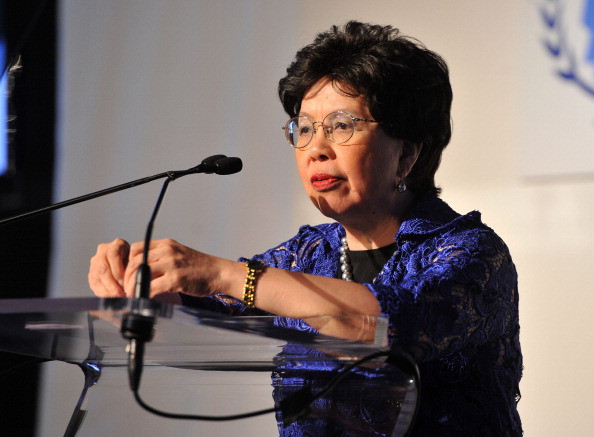Ebola Crisis: Head of World Health Organisation Warns of Global Catastrophe as Epidemic Spirals Out of Control

The World Health Organisation has warned that the deadly ebola virus could spread to other countries and become a global crisis.
The warning came from the head of WHO Dr. Margaret Chan, who said that the epidemic in West Africa is spiralling out of control and could potentially cause a catastrophic loss of life.
Speaking at a regional summit of the leaders of Guinea, Sierra Leone and Liberia in the Guinean capital of Conakry, Dr Chan issued the warning and described the response to the virus so far as "woefully inadequate."
"If the situation continues to deteriorate, the consequences can be catastrophic in terms of lost lives, but also severe socio-economic disruption and a high risk of spread to other countries.
"It is taking place in areas with fluid population movements over porous borders, and it has demonstrated its ability to spread via air travel, contrary to what has been seen in past outbreaks," she explained.
"Cases are occurring in rural areas which are difficult to access, but also in densely populated capital cities. This meeting must mark a turning point in the outbreak response."
She added that the virus, which has claimed 729 lives in four West African countries since February, could be stopped if well managed.
Dr Chan said the virus was affecting a large number of doctors, nurses and other health care workers who have an essential role in curtailing the outbreak. In Liberia, authorities say 28 out of the 45 health workers who have contracted the disease so far have died.
"To date, more than 60 health care workers have lost their lives in helping others. Some international staff are infected. These tragic infections and deaths significantly erode response capacity," she said.
"Constant mutation and adaptation are the survival mechanisms of viruses and other microbes. We must not give this virus opportunities to deliver more surprises."
As part of a $100 million emergency response to the epidemic which has claimed more than 700 lives, hundreds of extra medical personnel will be deployed to the affected region.
The first cases of Ebola emerged in Guinea in March, and later spread across the borders to Liberia and Sierra Leone. Outbreaks of the virus in previous years had occurred in other parts of Africa.
The outbreak, which has been described as the largest ever in the nearly four-decade history of the disease, with 1,201 Ebola cases reported, starts with flu-like symptoms before evolving to cause internal bleeding.
The virus has infected three African capitals with international airports and officials are trying to step up screening of passengers.
Experts say the risk of travellers contracting it is considered low because it requires direct contact with bodily fluids or secretions such as urine, blood, sweat or saliva. Ebola can't be spread like flu through casual contact or breathing in the same air. Patients are contagious only once the disease has progressed to the point they show symptoms, according to the WHO.
Sierra Leone today declared a public health emergency to tackle the deadly virus and called in security forces to quarantine infected areas.
Chan's warning comes as it was confirmed that two American missionaries infected with ebola in West Africa are to be flown back to the US.
Arrangements are being made for a chartered flight to land at Dobbins Air Base in Marietta, Georgia to transport Dr Kent Brantly, 33, and 59-year-old Nancy Writebol from the region.
Two other American peace corps volunteers have been isolated after becoming exposed to ebola in West Africa and are under observation, though neither has shown any symptoms.
One US citizen has already died of the virus
© Copyright IBTimes 2025. All rights reserved.






















